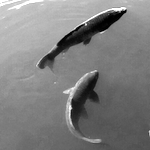The mimicry of swimming behaviors of microorganisms has been incessantly pursued in material science and many other research fields. Though arduous endeavors have been undertaken to imitate the motion of swimming entities, the fundamental principle of operating at out-of-equilibrium in living systems is beyond quest. More importantly, attempts adopted to break Purcell's scallop swimming reciprocity in low Reynolds number fluids often sacrifice locomotion efficiency as a recovery stroke is accompanied with its power stroke. Here, we report an optically powered soft material torus that can perform autonomous swimming motion under constant power source in viscous fluids. The swimmer, made of thermally contractile liquid crystal cylinder responding to visible light, is able to undergo spontaneous eversion on hot plate with the presence of prestrain in the enclosed loop, in which superimposed gradient fields can induce an embedded torque (motor wheel), enabling the formation of zero-elastic-energy modes (ZEEMs). When exposed to constant light input, the unidirectional eversion refrains the artificial swimmer to relax in the counter direction, that is to say, a full forward motion can be attained, and the operation regime can be further tuned in Stokes fluids by adjusting light intensity, torus scale, fluid viscosity, etc. The results can open new possibilities for stimulating novel designs for synthetic swimmers that possess bio-like functions at their non-equilibrium states.

 PDF version
PDF version
